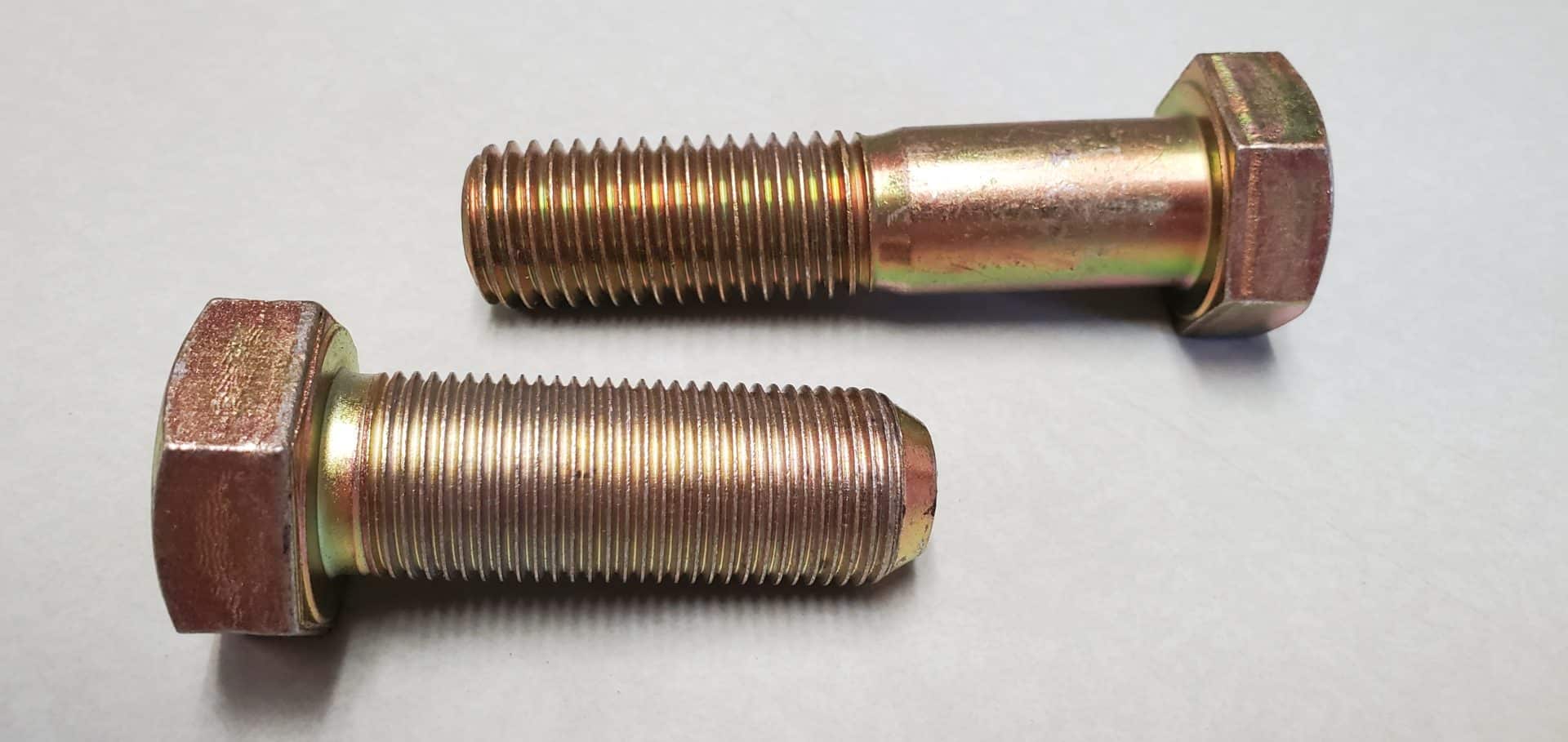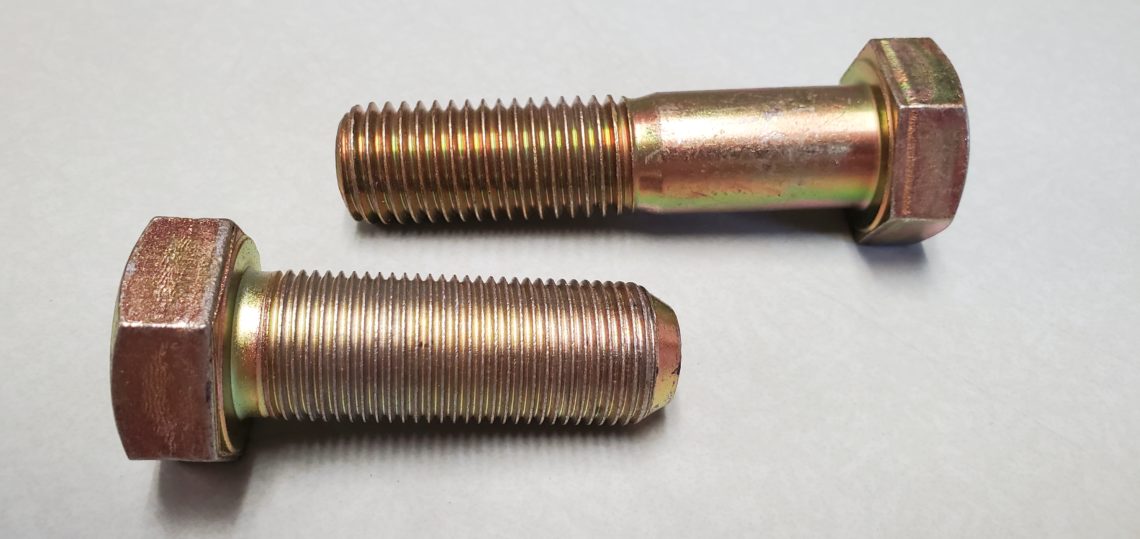Threads are an essential component of many fasteners. They are how fasteners work to join parts together and keep them secure for extended periods of time. But there’s probably more that goes into choosing and manufacturing the right fastener thread for your application than you might think. Let’s look at a few common types of fastener threads, and discuss why there are multiple types in the first place.
What Is a Threaded Fastener?
For starters, there’s a multitude of different types of fasteners — but for the most part, they can all be placed into three main categories: fixed, locking, and threaded. We’re focusing on threaded here.
Threaded fasteners feature a helix on the external or internal surface of a cylindrical shaft. This helix, which looks like a spiraling ramp, helps to transform torque (rotational force) into a linear force. Screws, bolts, studs, and nuts are all great examples. Screws, bolts, and studs all have external threads, while nuts have internal threads.
Basic Fastener Thread Terminology
Before we dive into common types of fastener threads, it’s useful to understand the terminology that’s used to describe their basic components and measurements. Here are a few of the terms and definitions that are important to know:
- Lead – The axial distance a threaded fastener advances during a single rotation.
- Major diameter – The largest diameter of a fastener thread. It’s measured from the crest (top) of a thread on one side to the crest of a thread on the other side.
- Minor diameter – The smallest diameter of a fastener thread. It’s measured from the root (bottom) of a thread on one side to the root of a thread on the other side.
- Nominal diameter – This is shorthand for “nominal major diameter” — and, in most cases, “nominal” just means “basically.” So it’s an estimated major diameter.
- Pitch diameter – The diameter of a theoretical cylinder that exists halfway between the major and minor diameters.
- Pitch – The distance from a point along one thread to that same point on the next thread. You can measure pitch from the crest, the trough, or any point in between.
Need help with a fastener term that’s not listed here? Check out our Guide to Fastener Terminology.
3 Common Types of Fastener Threads
Just like most things in the fastener world, there are standards used to define different types of threads. The one that’s most commonly used in the United States is the Unified Thread Standard (UTS), which is currently controlled by the American Society of Mechanical Engineers (ASME). UTS defines standard threads and series, listing their specific allowances, tolerances, and designations. It’s also important to note that UTS deals only with inch threads. Metric threads are a whole ‘nother animal.
Let’s discuss three UTS fastener thread series below. While these aren’t the only types of fastener threads, they are some of the most prevalent in UTS.
UNC Fastener Threads
UNC stands for Unified National Coarse threads. The series includes all fasteners with (you guessed it!) coarse threads. While specific measurements can vary from fastener to fastener, coarse threads typically have a larger pitch measurement. This means they’re generally “bigger” threads, and there are therefore usually fewer of them on a fastener.
Since coarse threads are typically bigger, their fit is deep. This allows for easy installation and removal.
UNF Fastener Threads
UNF stands for Unified National Fine threads. The series includes all fasteners with (big surprise again here) fine threads. And while these specific measurements can vary, fine threads typically have a smaller pitch measurement. This means they’re generally “smaller” threads, and there are therefore usually more of them on a fastener.
Because of their many threads and larger minor diameter, UNF fasteners typically have better torque-locking and load-carrying abilities. They often also have tighter tolerances and can support heavier loads. This makes them ideal for heavy-duty applications.
8-UN Fastener Threads
8-UN is a fastener thread series that includes fasteners with eight threads per inch (TPI). Broadly speaking, UNC and UNF threads are much more popular, but 8-UN threads are still worth mentioning.
8-UN threads were originally intended for high-pressure joint bolts and nuts. However, they’re now used as a substitute for UNC threads with diameters larger than 1”.
Why Are There Different Types of Fastener Threads?
So what’s the point of these different types of fastener threads? Why can’t one thread work for all applications?
To put it simply, different types of fastener threads allow for different performance capabilities. And it’s important to choose the thread that’s ideal for your application if you want the best results. We’ve briefly touched on this in the sections above, but we’ll give a few more details here — specifically hitting on the pros and cons of coarse vs. fine fastener threads, since those are the most common.
RELATED: Need a specialty bolt, screw, or stud? Wilson-Garner can help.
Pros & Cons of Coarse Fastener Threads
Coarse threads offer the following advantages:
- Quick, easy assembly and disassembly
- Improved fatigue resistance
- Better tapping into brittle materials
- Allow for thicker platings and coatings
However, coarse threads do have a weaker tensile strength because the minor diameter is smaller.
Pros & Cons of Fine Fastener Threads
Fine threads offer the following advantages:
- Higher tensile strength
- Improved torque-locking abilities
- Better tapping into thin-walled members
- Closer adjustment accuracy (due to smaller helix angle)
However, fine threads do come with their own set of disadvantages. Mainly, they can be nicked and damaged much easier than coarse threads. Also, smaller threads (and more of them) make these fasteners a bit more difficult to gauge.
At Wilson-Garner, we can produce the specialty bolts, screws, and studs you can’t find anywhere else, in the small quantities you need. If you’re looking for a unique fastener solution for your application, contact us to see how we can help.


